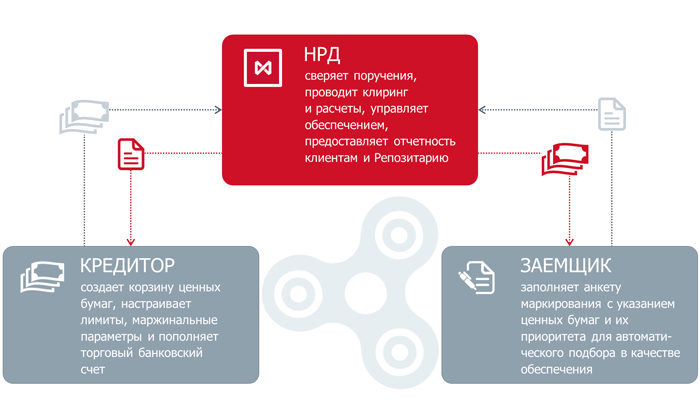The service is designed to provide liquidity to Russian commercial banks through tri-party repo trades with the Bank of Russia, involving NSD's Collateral Management System (CMS). The purpose of the service is to offer more trading and settlement opportunities to market participants and to help them reduce their costs. The service has also helped improve collateral management processes in repo trades.
Bank of Russia's repo trades with a securities basket were launched on 15 April 2013, and any Russian credit institution that satisfies the Bank of Russia's eligibility requirements may use the service. Repo trades may only be made on behalf and at the cost of a credit institution itself, and only owner securities accounts may be used for securities allocation and settlement.
With effect from 1 January 2017, the Bank of Russia introduced a new standard form of a universal master agreement under which it is possible to enter into on-exchange repo trades with the Bank of Russia with a basket of RUB/USD-denominated securities. On 19 June 2017, Bank of Russia's repo trades involving the use of NSD's collateral management services were launched on Moscow Exchange. The MICEX TRADE SE terminal may also be used by traders to make trades and give instructions.

CMS for Bank of Russia's repo trades with a securities basket offers a number of significant advantages:
- Minimum haircuts for securities
Thanks to NSD's CMS, Bank of Russia faces lower risks and may, therefore, reduce haircuts for repo trades with any maturity to the level of a haircut for one-day repo trades
- Improved effectiveness of assets usage
A credit institution may instruct that only specific securities be provided as collateral, of a particular quantity and with particular priorities. Thanks to collateral allocation and substitution in NSD's CMS, it is possible to settle trades using any securities provided to the Bank of Russia as collateral.
- Reduced costs
Transactions do not involve any fee for making trades. The depository fee for transactions associated with collateral management is part of the fee charged for collateral management services, and the number of such transactions does not affect client's costs.

